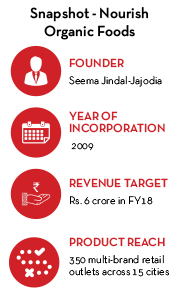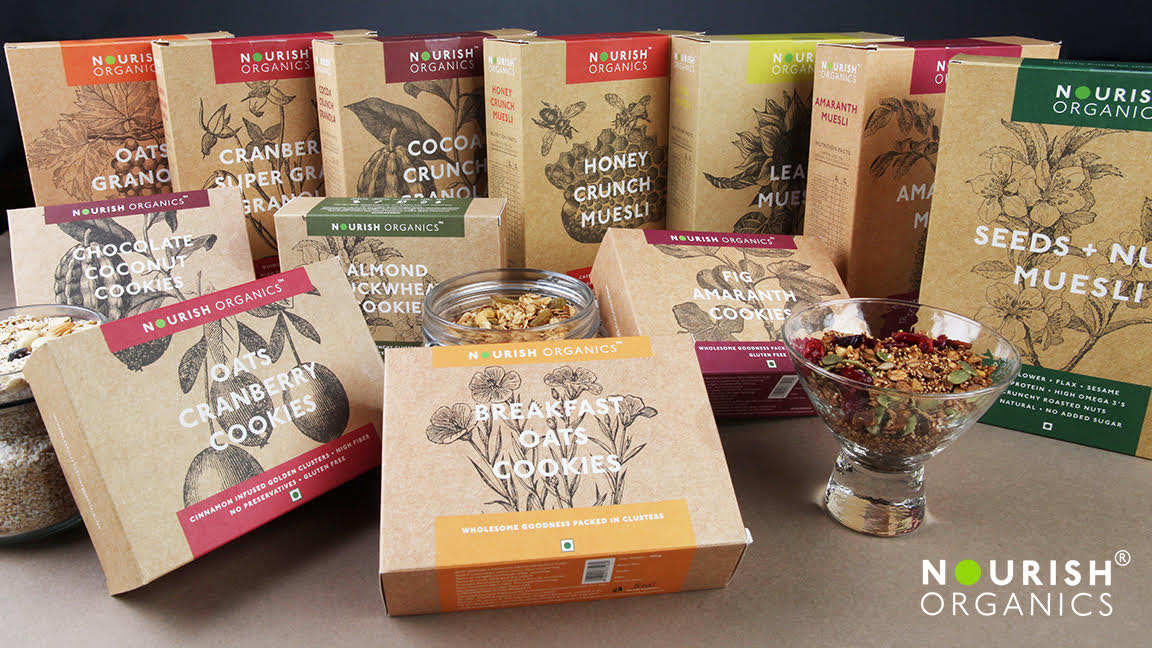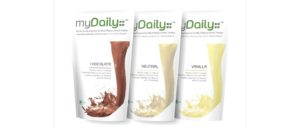Prior to founding Nourish Organics, Seema Jindal-Jajodia worked with her family business’ CSR arm, focusing on the needs of special children. But several personal experiences, led her to start-up a venture that’d enable healthy eating. She launched Nourish Organics with a line-up of products that included Amaranth Muesli, Active Flax Seeds, Sunflower seeds, Almond Buckwheat Cookies and Banana Oat Bars. Today, she’s gearing up to rapidly build a mass market consumer product.

When Seema Jindal-Jajodia founded Nourish Organic Foods in 2009, it was a time when the term ‘organic’ was still finding its footing in the Indian diaspora. Although it caught the attention of many, there was still scepticism about what kind of organic food to buy, lack of awareness around seasonal fruits and vegetables, and of course, the high costs associated with organic products. While earlier, the brand overcame this by interacting more with its customers through online and offline channels, the focus was still on serving a niche clientele. Today, of course, Nourish is gearing up to go mainstream. As Jajodia says, “Earlier, these products were available only in select stores. But now, with organic becoming a buzzword, the term has found appeal among the mass markets too. It’s a good sign, because it indicates more opportunities for us to grow.”
A Renewed Growth Strategy
While the core proposition for Nourish; that of providing organic, healthy food has remained constant, the brand has seen several changes in its approach to marketing, distribution and product development, over the years.
Nourish Organic’s plant is setup in Manesar (Haryana), where its collection of 34 products from health bars to breakfast cereals is packaged.
For example, earlier, while Jajodia initially setup a retail store format in New Delhi to increase the brand’s presence, she realised over time that placing her products in modern multi-brand retail stores would be a better strategy. “Customers don’t want to take to single brand retail stores; they want more options. Within these stores, we might explore a store within store model,” notes she. Accordingly, today, Nourish’s products are available across 350 category-A outlets and speciality formats in 15 cities including New Delhi, Gurugram, Mumbai, Bengaluru, Chennai, Kolkata, Gujarat and parts of Rajasthan.
On the distribution front, while the brand began by initially importing from Holland, when Jajodia realised that quality raw materials (including raisins, almonds and walnut) were available in India, she started sourcing locally too. “The sourcing part is fraught with challenges. The local vendors prefer exporting it to other countries because their margins are higher. That means, we are forced to source material from outside too,” she explains.
 With a single manufacturing plant setup in Manesar (Haryana), Nourish currently sells 34 varieties of its breakfast cereals, cookies, health bars, seeds and nuts, and snacks and crackers. Product development, at the company, takes about a year, with the products tested for shelf life, nutrition and taste, and trials conducted at the stores to receive customers’ feedback before they are marketed. “We’ve also changed the packaging; we’ve reduced plastic consumption and also automated the packaging process, which was earlier handmade,” she adds. The company has also introduced new products into the market, such as oats granola, protein bars and unprocessed chocolate products. “These are all my recipes, so the taste becomes a unique differentiator,” she points out.
With a single manufacturing plant setup in Manesar (Haryana), Nourish currently sells 34 varieties of its breakfast cereals, cookies, health bars, seeds and nuts, and snacks and crackers. Product development, at the company, takes about a year, with the products tested for shelf life, nutrition and taste, and trials conducted at the stores to receive customers’ feedback before they are marketed. “We’ve also changed the packaging; we’ve reduced plastic consumption and also automated the packaging process, which was earlier handmade,” she adds. The company has also introduced new products into the market, such as oats granola, protein bars and unprocessed chocolate products. “These are all my recipes, so the taste becomes a unique differentiator,” she points out.
Marketing It Right
Priced at between Rs. 55 to Rs. 400, the products at Nourish are typically marketed through tasting sessions and partnerships at sports-related events, which see a higher footfall of health conscious customers. These activities, Jajodia believes, will help the company touch revenues of Rs. 6 crore in FY18. “We’re not looking at raising external capital either, although we’ve been approached by investors. We might consider it once we cross the revenue mark for FY18,” she adds, lucidly. With her offline and online (Amazon Launch Pad) sales strategy set, along with a proven product mix, Jajodia seems geared up for the company’s next phase of growth.
Insights from Nourish
Distribution Approach: While the brand initially setup exclusive retail outlets in New Delhi to sell its products, it soon took to distributing in multi-brand retail outlets realising that customers want access to more options when purchasing products.
Product Development Approach: With each recipe created by Jajodia, the process takes about a year, with the products tested for shelf life, nutrition and taste analysis, and trials at the stores to receive customers’ feedback before they are marketed.
Marketing Approach: While the early days was about creating awareness about organic food through social media channels, the brand is now taking to tasting sessions and partnerships at sports-related events to market its products.


